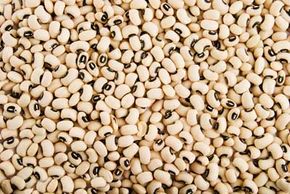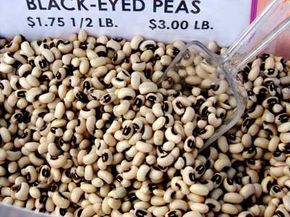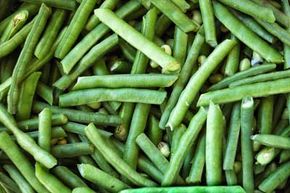When your diet's based on protein -- and fiber-rich beans and other complex carbohydrates -- you're more likely to feel full sooner. In addition, a diet high in fiber can reduce your risk of developing diabetes and help lower blood cholesterol levels, which can reduce your risk of heart disease.
Complementing California black-eye peas with grain foods, like rice, makes them a great substitute for higher fat protein sources like meats. California black-eye peas are also filling enough to stave off hunger. The low-fat, high-fiber nature of a bean-centered diet means chances are good that you'll lose weight eating this way. The 2005 Dietary Guidelines for Americans recommend eating 3 cups of beans per week.
Health Benefits of California Black-Eyed Peas
Not only are California black-eye peas low in fat and high in quality protein, but they also have the added bonus of soluble fiber's disease -preventing qualities. The soluble fiber in beans dissolves in water, trapping bile acids in its gummy goo. This lowers blood levels of damaging LDL cholesterol, especially if LDL cholesterol levels were high to begin with, without compromising the level of protective HDL cholesterol.
Because beans are singled out for their soluble fiber, you may not realize they also provide substantial insoluble fiber, which helps combat constipation, colon cancer, and other conditions that afflict your digestive tract.
How? Insoluble fiber absorbs water, which swells the size of stool, puts pressure on the intestines, and moves everything along faster. To help combat the gas problem -- caused by indigestible carbohydrates -- let your body get used to eating beans. Start slowly, eating only small amounts at first, and try to eat them when you know you'll be active afterward; it helps break up the gas.
California black-eye peas contain several types of phytochemicals. They are rich in lignans, which may play a role in preventing osteoporosis, heart disease, and certain cancers. The flavonoids in beans may help reduce heart disease and cancer risk. Phytosterols, also in legumes, help reduce blood cholesterol levels.
Black-eyed peas provide a number of nutrients, are a rich source of fiber and can be used in a number of recipes. For vegetarians, such beans can provide a needed source of iron. No matter how you choose to prepare them, black-eyed peas can be a wonderful supplement to your healthy eating plan.
? Try:
- Vegetable Recipes: Quick guides to delicious meals using peas and other vegetables.
- Nutrition: Find out if eating black-eyed peas fits in with your overall nutrition goals.
- Vegetable Gardens: Grow a full harvest of great vegetables this year.
- Gardening: We answer your questions about all things that come from the garden.
This information is solely for informational purposes. IT IS NOT INTENDED TO PROVIDE MEDICAL ADVICE. Neither the Editors of Consumer Guide (R), Publications International, Ltd., the author nor publisher take responsibility for any possible consequences from any treatment, procedure, exercise, dietary modification, action or application of medication which results from reading or following the information contained in this information. The publication of this information does not constitute the practice of medicine, and this information does not replace the advice of your physician or other health care provider. Before undertaking any course of treatment, the reader must seek the advice of their physician or other health care provider.


